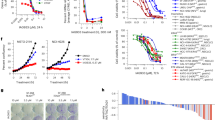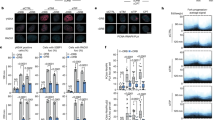Abstract
Mutations of the p53 tumor-suppressor gene are the most frequent genetic abnormality in soft tissue sarcomas. Because these rare tumors also respond poorly to standard chemotherapy and bear a 50% 5-year mortality rate, we investigated the possible therapeutic benefits of p53 gene restoration in sarcomas. We constructed Ad5p53, which is an E1A-deleted, replication-deficient adenovirus expressing a cytomegalovirus promoter-driven wild-type p53 cDNA with a Flag sequence tag. SKLMS-1 human leiomyosarcoma cells containing a mis-sense p53 point mutation were effectively transduced with Ad5p53. Increasing levels of Flag-p53 protein, as well as dose-dependent p21Cip1 induction, were observed through a dose range of 10–500 plaque-forming units (PFU)/cell. In vitro administration of Ad5p53 as a single 100 PFU/cell dose caused 40–60% growth inhibition of SKLMS-1 cells at posttreatment days 4, 6, and 8 compared with untreated or viral control treated-cells (P < .05, Student's t test). Relative to these same controls, in vivo treatment of SKLMS-1-bearing severe combined immunodeficient mice with 6 × 109 PFU of Ad5p53 by intratumoral injection resulted in a 35-day tumor growth delay and complete tumor regression in 40% of mice (P < .05, Student's t test). The expression of virally derived p53 mRNA in Ad5p53-treated tumor tissues was detected in treated tumor specimens by reverse transcriptase polymerase chain reaction. Reduced intratumoral cellularity and the presence of p53 staining in adjacent normal tissue, consistent with delivery of exogenous p53 to the tumor target, were evident only in Ad5p53-treated tumors after immunohistochemical staining for p53. These results indicate that wild-type p53 gene restoration in sarcomas retards tumor growth and may come to be usefully applied to the clinical treatment of this disease as a single regimen or in combination with conventional therapies.
This is a preview of subscription content, access via your institution
Access options
Subscribe to this journal
Receive 12 print issues and online access
$259.00 per year
only $21.58 per issue
Buy this article
- Purchase on Springer Link
- Instant access to full article PDF
Prices may be subject to local taxes which are calculated during checkout
Similar content being viewed by others
Author information
Authors and Affiliations
Rights and permissions
About this article
Cite this article
Milas, M., Yu, D., Lang, A. et al. Adenovirus-mediated p53 gene therapy inhibits human sarcoma tumorigenicity. Cancer Gene Ther 7, 422–429 (2000). https://doi.org/10.1038/sj.cgt.7700141
Received:
Accepted:
Published:
Issue Date:
DOI: https://doi.org/10.1038/sj.cgt.7700141



